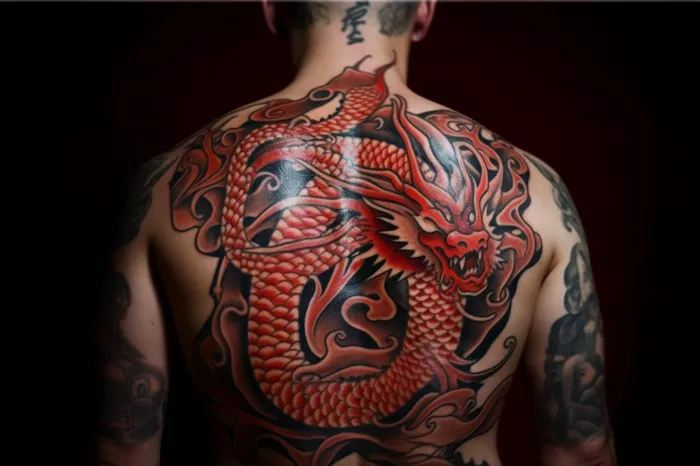Japanese dragon tattoos hold deep cultural significance. In Japan, dragons symbolize strength, wisdom, and protection. Unlike their Western counterparts, which often depict dragons as destructive beasts, Japanese dragons are seen as benevolent and wise creatures. They are often associated with water and rainfall, representing fertility and good fortune. Understanding these cultural nuances adds depth to the tattoo experience, making each piece more than just body art.
The Aesthetic Appeal of Simple Dragon Tattoos
Minimalism in Tattoo Design
Minimalism has become increasingly popular in tattoo art. Simple designs often feature clean lines and limited detail, which can create a striking visual impact. In the context of Japanese dragon tattoos, minimalism allows the essence of the dragon to shine through without overwhelming the viewer. The simplicity emphasizes the shape and form, making it a timeless choice.
Symbolism Over Complexity
In simple designs, the focus shifts to the symbolism rather than intricate details. A well-placed line or curve can convey the dragon’s strength or fluidity. This approach resonates with many tattoo enthusiasts who appreciate meaningful art that does not require excessive embellishment.
Common Elements of Japanese Dragon Tattoos
The Dragon Itself
The dragon’s form is crucial in Japanese tattoos. A typical Japanese dragon features three claws, while Chinese dragons often have four. The three-clawed dragon is associated with Japan and is often depicted as sinuous and graceful. The design can vary from the full-bodied dragon coiled around an object to just the head.
Additional Symbols
To enhance the tattoo’s meaning, artists often incorporate other elements. Common symbols include:
Water Waves: Representing the dragon’s control over water and its connection to nature.
Clouds: Indicating the dragon’s ability to soar above and its divine nature.
Lotus Flowers: Symbolizing purity and spiritual enlightenment.
Color Choices
While simple designs often lean towards black ink, incorporating color can add depth. Traditional colors include shades of blue and green, representing water and life. Black and gray can give a classic, bold look, while colors like red can symbolize power and courage.
See also: Simple Dragon Tattoo Designs: Elegant and Powerful Ink Ideas
Placement of Simple Japanese Dragon Tattoos
Popular Placement Areas
Where you place your tattoo can enhance its impact. Some popular areas for simple dragon tattoos include:
Arm: A forearm or upper arm tattoo allows for visibility and personal expression.
Back: A simple dragon design can look striking on the back, allowing for more space.
Leg: Calf tattoos are also an excellent option for showcasing simple designs.
Size Considerations
The size of the tattoo is essential in determining its overall impact. Simple designs can work well in both small and large sizes. A small dragon on the wrist or ankle offers a subtle nod to the wearer’s personality. In contrast, a larger piece can create a bold statement on the back or thigh.
Choosing the Right Artist
Importance of Experience
Selecting a tattoo artist skilled in Japanese art is crucial. Experienced artists understand the cultural significance and nuances of Japanese dragon designs. Their expertise can ensure the design captures the intended meaning while fitting your personal style.
Reviewing Portfolios
Before committing, review artists’ portfolios. Look for previous work that aligns with your vision of simplicity and style. An artist’s portfolio can provide insight into their technique and the quality of their work.
Care and Maintenance of Your Tattoo
Initial Aftercare
Proper aftercare is vital for healing. Follow these steps:
Keep the tattoo clean and dry for the first few days.
Apply a recommended ointment to prevent infection.
Avoid soaking the tattoo in water during the healing process.
Long-Term Care
To maintain the tattoo’s appearance over time:
Use sunscreen on the tattooed area to prevent fading.
Keep the skin moisturized to retain color and detail.
Regularly check for any signs of fading or damage.
The Journey of Getting a Dragon Tattoo
Understanding Your Motivation
Before getting inked, reflect on why you want a dragon tattoo. Understanding your motivation can help guide your design choice and placement. Whether it’s for personal empowerment, cultural appreciation, or artistic expression, knowing your reason adds meaning to the tattoo.
6.2 The Experience
The tattooing process can be both exciting and nerve-wracking. Prepare yourself for the sensation of the needle. Remember, the experience is part of the journey, contributing to the personal connection with the artwork.
7. Conclusion: Embracing the Simplicity of Japanese Dragon Tattoos
Simple Japanese dragon tattoo designs offer a blend of cultural significance and aesthetic appeal. Their minimalist approach emphasizes the beauty of the dragon while allowing for personal expression. Whether you choose a small, discreet design or a more prominent piece, the dragon’s symbolism of strength and protection remains a powerful statement. As you embark on your tattoo journey, embrace the simplicity and depth that these designs offer, making them a meaningful addition to your body art collection.

